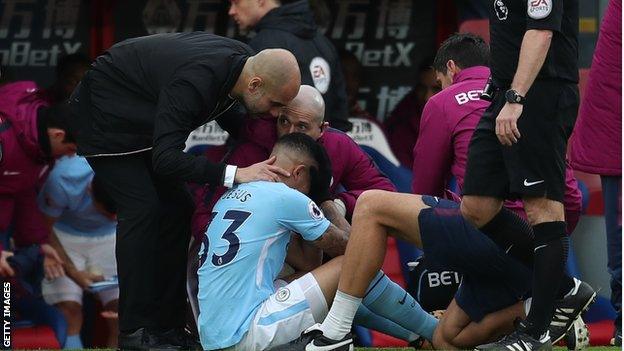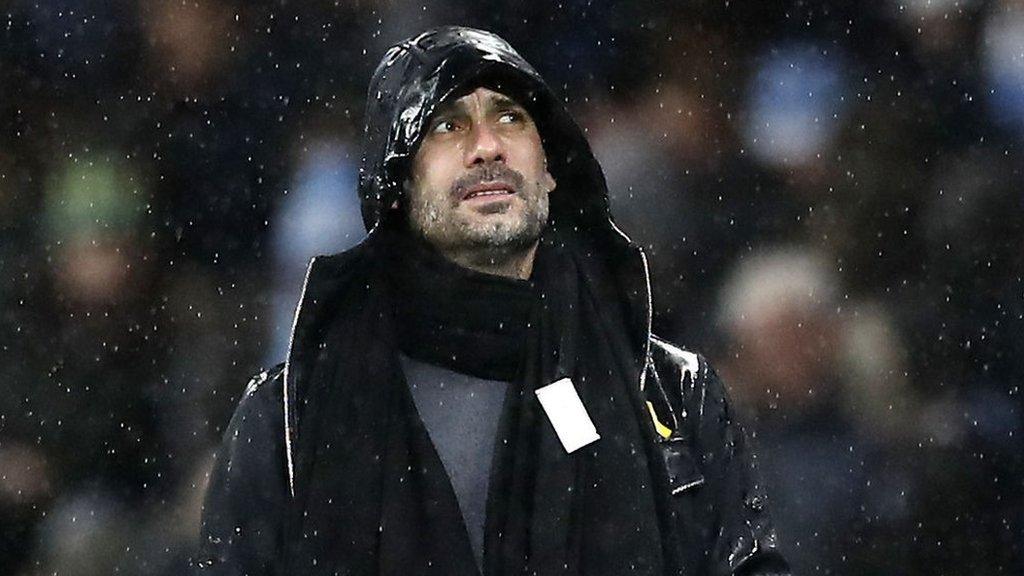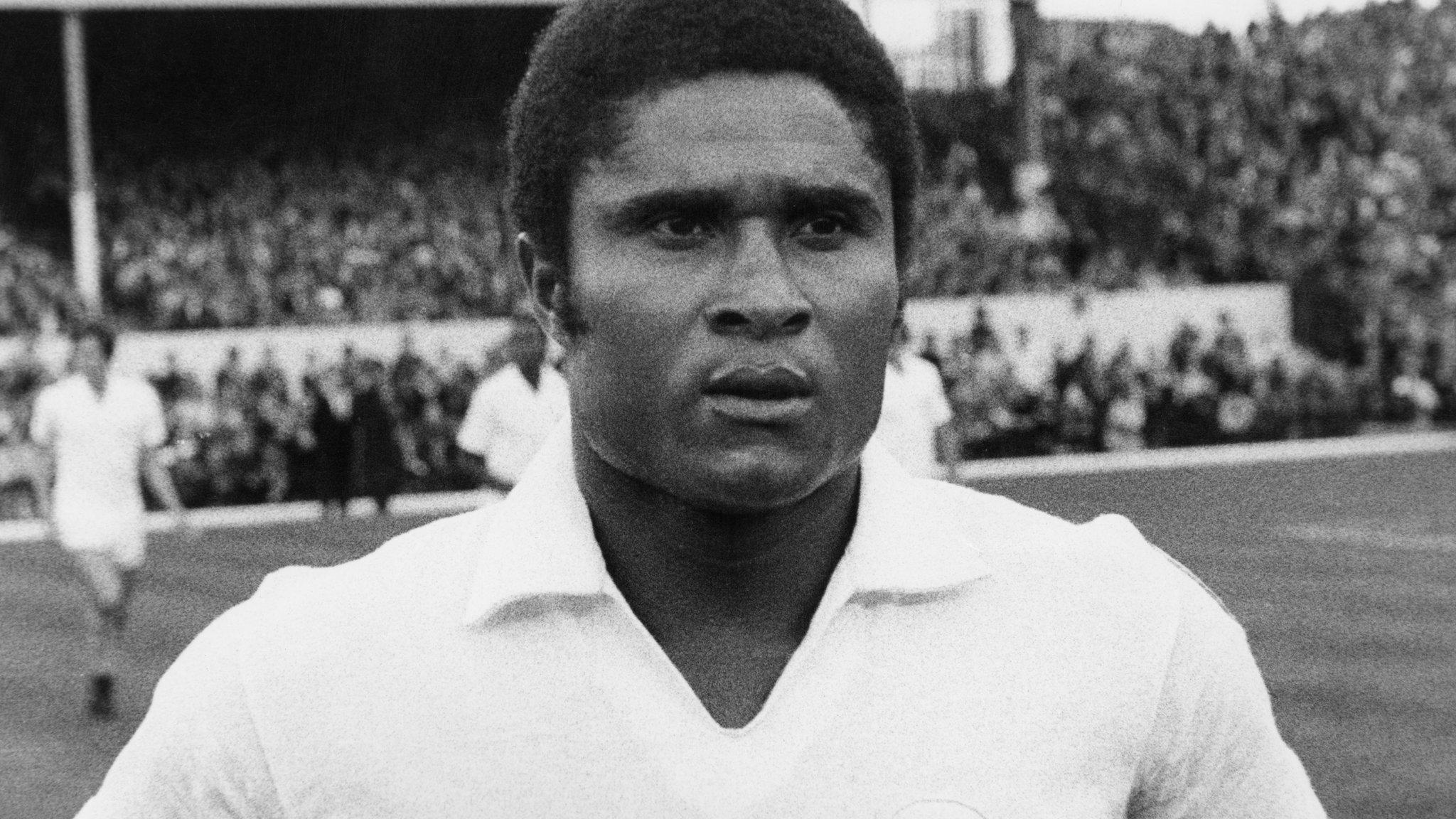Premier League festive fixtures lead to an increase in injuries, says analyst
- Published
- comments

Gabriel Jesus went off in tears during Manchester City's draw with Crystal Palace on Sunday after suffering a knee injury
Pep Guardiola said the festive period was "killing" the players - but is he right?
The Manchester City boss voiced his concerns over the congested fixture list, while West Brom wanted their match at West Ham on Tuesday postponed, complaining to the Premier League about playing two games in 48 hours.
A number of teams have endured that same turnaround over Christmas and New Year, while others have enjoyed more rest with festive fixtures falling on 14 separate matchdays.
So what do the injury statistics say?
Injuries as a whole went up by 32% in December 2017, compared to previous months of the season, according to figures from injury data analyst Ben Dinnery.
The biggest increase was in soft tissue injuries, damage to muscles, ligaments and tendons. These went up by 45%, from a monthly average of 43.5 to 65 last month.
"The spike is due in part to congestion around fixtures," sports therapist Dinnery told BBC Sport.
"Medical research tells us the more minutes you play, the more injuries are likely to occur. The optimum recovery for players is between 48 and 72 hours, otherwise players become more susceptible to muscular injuries and fatigue."
Who is suffering the most with injuries?
Watford currently have the longest injury list with nine players on the sidelines, with Liverpool missing eight, and Bournemouth and West Ham without seven.
If you are viewing this page on the BBC News app please click here, external to vote.
How previous seasons compare?
This season (2017-18) there were five rounds of fixtures between Saturday 16 December and Thursday 4 January inclusive - 50 fixtures spanning 14 separate matchdays.
Last season saw four rounds of fixtures between Saturday 17 December 2016 and Wednesday 4 January 2017 inclusive, with those 40 fixtures played on 12 separate matchdays.
The 2015-16 campaign was also four rounds of fixtures played between Saturday 19 December 2015 and Sunday 3 January 2016 inclusive, but the 40 fixtures were played on nine separate matchdays.
In 2013-14, four rounds totalling 40 fixtures were played between 14 December and 1 January inclusive, on nine separate matchdays.
2017/18 | 2016/17 | 2015/16 | 2014/15 | 2013/14 | |
Monthly average injuries (Aug to Nov) | 103 | 114.25 | 112.25 | 116.75 | 118.75 |
December injuries | 136 | 115 | 128 | 141 | 145 |
Monthly average soft tissue injuries (Aug to Nov) | 43.5 | 47.75 | 49 | 50 | 45.75 |
December soft tissue injuries | 65 | 42 | 58 | 66 | 61 |
Source: Premierinjuries.com, external | |||||
How much rest?
Just focusing on the four rounds of fixtures closest to Christmas and New Year, Leicester City had the tightest schedule, with 213 hours spanning the four games starting with their 23 December draw with Manchester United and ending with the 1 January visit of Huddersfield.
West Ham, meanwhile, play their four fixtures in a comparatively leisurely 294 hours and 45 minutes after their New Year's Eve game with Tottenham was moved to 4 January for safety reasons. That gives them the equivalent of more than three days of extra rest.
'Clubs were warned - and did not protest'
All Premier League clubs were told at the start of this season the schedule would be condensed due to the need to fit in an extra round of games because of an early finish for the 2018 World Cup in Russia.
The Premier League says it warned the clubs about fixture congestion over the festive period at the start of the season and none protested.
In a statement, the league said scheduling is "complex" as it has to balance numerous factors, such as avoiding two home games for close neighbours, police requests and the "understandable desire of the broadcasters to gain a return on their huge investment in the game".
"These challenges were highlighted to all of our clubs ahead of the season, and all understood that there could be no perfect solution which would meet all clubs' individual preferences," it added.
What you think about festive football:
BBC Sport asked users to join in the debate. Here is a selection of your responses.
Dan in Braintree: Football players play 180 minutes in 48 hours. Roger Federer is older than most prem players and will play 2 5-set games each at 5 hours in 48 hours and he still looks like he is sitting at a bar having a good time. Surely it is down to preparation and a proper cool down. How many football players take ice baths?
Jan in Bolton: We have to accept that Premier football is now a game played by fine-tuned athletes and as with any sports with the same demands, it is impossible to effect a full recovery in 48hrs. The cumulative effect of this causes problems.
Cheech: I think that the festive fixtures is what the premier league is all about but they should get a 2 week break afterwards. It will allow the players to get a decent rest.
Neil Fogarty: Maybe, if teams stopped their closed season football tournaments on other continents, players would have more time to recover etc. Christmas period football is great entertainment that fans and TV companies pay to see happen.
Dylan Lewis: 'You get paid enough, stop whingeing and get on with it!" Not the point. They get paid to produce high quality football. Playing 3 games in 8 days is not preparing players to play high quality football, only to get injured.
Tim Smith: Pep's entitled to point out how tough the fixture list is, but I reckon it sets the Prem apart. It adds unpredictability and makes the league much tougher than others. I don't think that's a bad thing.
Trevor in Clitheroe: The issue raised by Guardiola should be a concern; there has been the thick end of 200 premier league games since 1 December; compare that to the number of games in all other top European games and then ask yourself why England struggle in major tournaments!
Lee: There are plenty of normal folk who have worked 12hr night shifts & long days all over the festive period. The notion that these highly tuned pampered athletes can't play two 90 minute matches in the space of 48hrs is beyond laughable.
The fixtures are relentless - Upson & Keown
- Published2 January 2018

- Published3 January 2018

- Published3 January 2018
